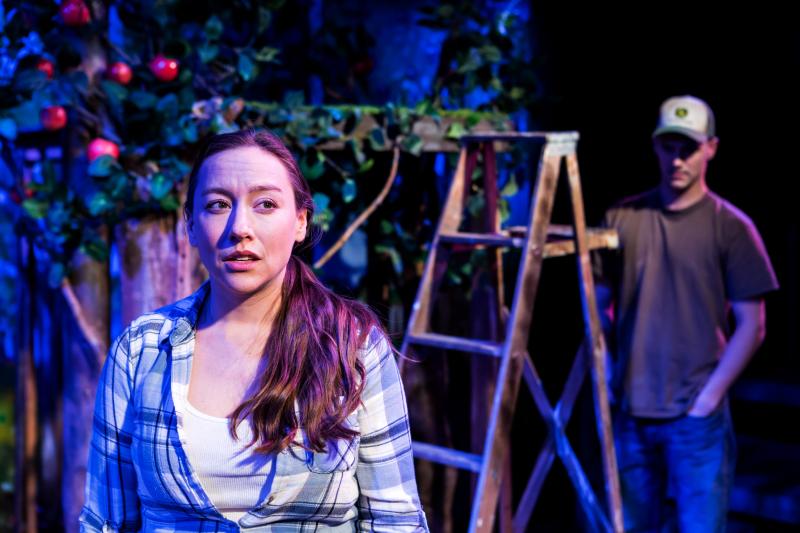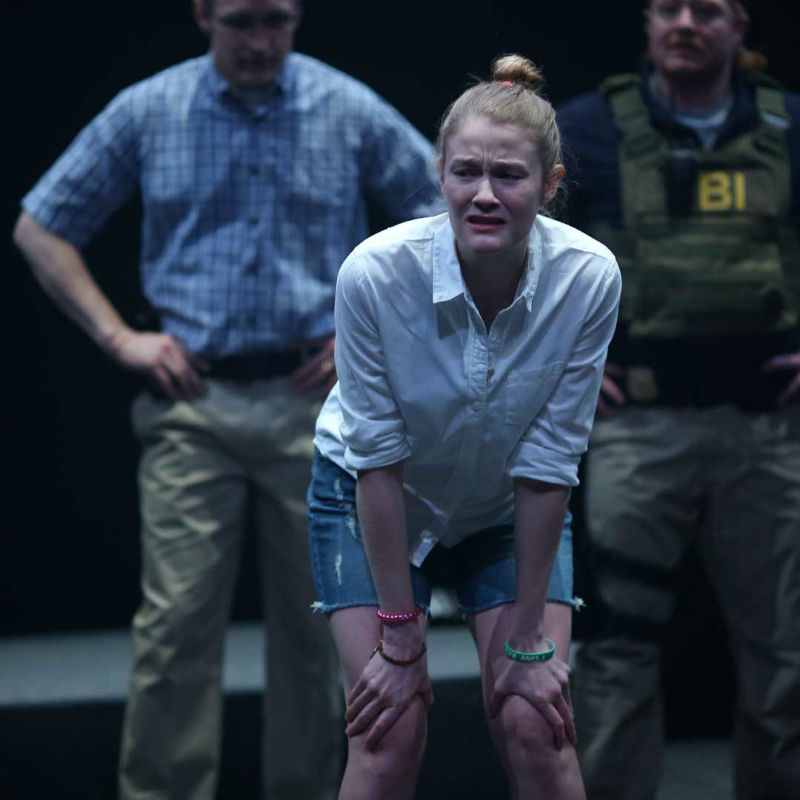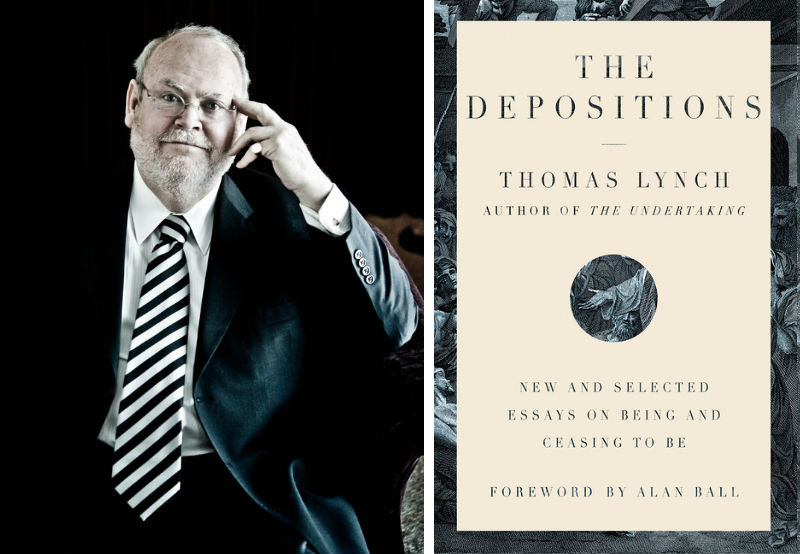U-M Gifts of Art's winter edition offers meditative, inspirational works in a variety of mediums

Every new season the University of Michigan Medicine’s Gifts of Art brings patients and visitors new exhibits of inspirational, meditative, and thought-provoking works by local and regional artists. For the winter edition, the eight gallery spaces provide uplifting and diverse works, executed in a wide range of media: straight photography, digitally altered photography, oil paintings, oil and chalk pastels, designer hats, multimedia sculptures, and paper sculpture.
AADL's "Music Tools Lab: Intro to Guitar Pedals" will give you a hands-on chance to sharpen your ax sounds

You’re at a show. Somewhere.
A band you’ve never heard of is busy hauling their gear onto the stage. The musicians fuss about adjusting amp volume, mic placement, cymbal height.
The group begins its first tune, and the guitar player, after a whisper-quiet intro in D, sends her sparkly white hollow-body Fender Mustang into a fit of feedback and fuzz, improbably multiplying every note she plays, chords modulating and warbling up and down and back and forth through the room as if she held a shattered mirror up to her amp’s speaker.
What just happened?
How does she do it?
For the 'Gram: Lee Minora’s “White Feminist” plays with doing-good-to-look-good activism

For one hour on Tuesday, my fellow theater-goers and I in the video studio of U-M's Duderstadt Center were transformed into the live studio audience for a fictional television morning talk show called Becky’s Time. Our host, Becky, portrayed by Lee Minora, was a blonde-haired, French-manicured, self-proclaimed feminist, ready to use her voice to fight for herself and for us -- whether we wanted her to or not.
White Feminist takes to task the white women who suddenly became “woke” after the 2016 presidential election, eager to jump in, take charge, and change the world, all while failing to realize that not only were people already doing that work, but they have been for decades. That day’s episode was devoted to “Ladies' Time” (or was it “Lady’s Time”?), yet there were no guests.
Beach Daisy's haunting music blooms with discontent on its debut EP

Despite the summery name Beach Daisy, the music by this Ann Arbor alt-pop quartet is anything but sunshine on its debut EP, Something They Can’t Take Away. It features seven haunting tracks about isolation, fractured relationships, and hopeful tomorrows.
“There’s a theme in a lot of them of loneliness and emotional solitude, and the final track on the EP is a response to a lot of those feelings,” said Beach Daisy guitarist-vocalist Zach Moorhaus.
As Beach Daisy, Moorhaus and bandmates Samantha Steinbacher (vocals, keys), Brandon Sams (drums), and Andrew Walsh (bass) tackle a spectrum of challenging emotions ranging from self-doubt to frustration to despair. In a sense, the band’s 30-minute EP eloquently reflects the ongoing struggle people face well into adulthood.
“With this EP, we really honed in and tried to make it cohesive. We tried to make a group of songs that refined our sound a little bit,” Steinbacher said.
Ann Arbor Civic Theatre finds the character-driven "Proof" a good fit on its Second Stage

Theater is sometimes about spectacle: chandeliers that crash before our eyes, ocean liners that seem to sail across a stage, or bloody battles at a Paris barricade.
Alex Duncan was interested in a different kind of theater when she suggested directing David Auburn’s Proof for the Ann Arbor Civic Theatre’s Second Stage. The play’s intimate drama of a troubled young woman and her relationships seemed right for the Civic’s small studio theater and Duncan’s minimalist approach.
“It’s beautiful,” she said. “The language is almost poetic. I’ve always liked dialogue and character-driven things as opposed to, I guess, a little more flash going on. It’s fun digging into the language and working with the characters and figuring out what the actors are going to bring to it and blend that with what I see in the show.”
Duncan, who graduated from Eastern Michigan University with a drama major, directed a Main Stage Civic Theatre production of Arsenic and Old Lace last year and when applications went out for production ideas this year, she proposed Proof. It wasn’t selected for the Main Stage, but in the second round of interviews it was picked for Second Stage.
Invisible Touch: "As Far As My Fingertips Take Me" explores the universal refugee crisis through a one-on-one encounter

Whenever I see news footage of refugees, I always think, “How bad would things have to get before I packed a bag and fled from my home?”
The answer, of course, is really, really bad, especially when doing so would likely put me in mortal danger and leave me vulnerable, indefinitely, in countless ways.
So I knew that As Far As My Fingertips Take Me -- a one-on-one installation performance that’s part of University Musical Society’s No Safety Net 2.0 theater series -- would likely challenge me and make the pain of diaspora more tangible. But what I couldn’t have guessed is how strangely attached I’d become to the visible marks it left upon my skin.
Created by Tania Khoury and performed by Basel Zaraa (a Palestinian refugee born in Syria), the experience begins when you bare your left arm to the elbow, sit next to a white wall, pull on a pair of headphones, trustingly extend your arm through a hole in the wall, and listen to a recording of Zaraa telling his own refugee story, accompanied by an atmospheric rap inspired by his sisters’ journey from Damascus to Sweden.
Theatre Nova actors shine in an otherwise thin "Apple Season"

E.M. Lewis’ Apple Season is a memory play. Memories haunt and suffocate three people who have had trouble moving on.
Three excellent actors bring quiet authority to their performances in Theatre Nova’s Michigan premiere of Lewis’ play under the direction of David Wolber. While Lewis’ play strains to be poetic, seems thin, and is too much like other family trouble dramas, but Wolber and his cast bring an honest realism to the story.
Apple Season is a story about dark family secrets, long-repressed emotions, and lost opportunities. Lissie has come back to her Oregon family home to bury her father and decide what to do with the family apple orchard. She is 36 years old, a fourth-grade teacher, and hasn’t been home since running away with her brother to an aunt’s house as a teenager.
60 Minutes: "Is This a Room: Reality Winner Verbatim Transcription" is a terse presentation on how one hour can upend a life

Is This a Room: Reality Winner Verbatim Transcription looks behind the headlines and the newspaper articles of the real case of Reality Winner, a young woman currently serving a lengthy prison sentence for the unauthorized release of classified documents. She had violated the Espionage Act, which dates back to 1917.
Presented as part of UMS's No Safety Net 2.0 theater festival, this roughly one-hour long show highlights a single moment in Winner’s life, her interview with the FBI that ultimately resulted in her arrest. The stage is almost empty of props, and the audience is focused entirely on the four performers, their dialogue, delivery, and use of personal space. At times, the all-male agents crowd Winner, the only woman present at the time of her interview, giving an appropriate feeling of claustrophobia. At one point, the actors’ speech seems to be slowed down or sped up, perhaps giving insight into Winner’s emotional state at that moment.
The dialogue itself comes from, as the title of the piece says, a verbatim transcription of the recording of the interview. It includes coughs, stumbling over words, people talking over each other, and random unrelated phrases (such as “is this a room”) while the agents both converse with Winner and search her home.
Cover Your Heads: Angélique Kidjo and others interpret Talking Heads

When Angélique Kidjo first heard Talking Heads' 1980 LP, Remain in Light, she instantly recognized the music's deep debt to Africa. That was in 1983, the year the singer had moved from her native Benin to Paris to study music. It was there that Kidjo began to absorb the city's confluence of Afropop, jazz, Latin, and rock, which she has turned it into a 40-year international career touching on all those styles.
That memory of hearing an American band apply African rhythms to art-rock stuck with Kidjo to such a profound degree that in 2018 she released a song-for-song cover of Remain in Light, which has received raves.
Kidjo turned to another inspiration -- Cuban singer Celia Cruz -- for her 2019 album, Celia, which won a 2020 Grammy. But when Kidjo performs at the Michigan Theater on Sunday, February 16, as part of UMS's current season, she'll highlight the Remain in Light project.
While Kidjo was the first artist to reinterpret all of Remain in Light in the studio, Phish's 1996 Halloween concert featured the jam band playing the album live in its entirety. Covering entire records like that is rare, but interpreting Heads tunes has been happening almost since the band debuted. One of the first was by German pop singer and actress Debbie Neon, whose version of "Psycho Killer" came out in 1979, two years after it appeared on Talking Heads: 77, the band's debut.
The next year, Massachusetts' The Fools released a parody version, "Psycho Chicken," and Heads covers have been nonstop since.
Popular groups such as The Lumineers ("This Must Be the Place (Naive Melody)"), Smashing Pumpkins ("Once in a Lifetime"), Florence and The Machine ("Wild Wild Life"), Umphrey's McGee ("Girlfriend Is Better"), Widespread Panic ("Life During Wartime"), Car Seat Headrest ("Crosseyed and Painless"), Yonder Mountain String Band ("Girlfriend Is Better"), and Phish again ("Cities") have had no fear of Talking Heads music.
The long-running Ann Arbor/Metro Detroit band Frontier Ruckus even recorded a special version of "This Must Be the Place (Naive Melody)" for a fan's wedding.
That song and "Once in a Lifetime" are among the most popular covers, but the clear number one is "Psycho Killer," which has been played by Velvet Revolver, Jason Isbell, Barenaked Ladies, Cage the Elephant, Local H, and more.
The "and more" is what we'll concentrate on below: the five quirkiest Talking Heads covers that I found on YouTube, starting with The Fools' fowl take. Plus, check out Kidjo's videos from her Remain in Light record as well as a special bonus Heads cover by a Chicago vocal legend who is also playing the Michigan Theater on February 15.
Writer, poet, and funeral director Thomas Lynch examines life and death in "The Depositions," a collection of new and selected essays

Essayist and funeral director Thomas Lynch writes, “By getting the dead where they need to go, the living get where they need to be.”
That quote forms the first sentence of “The Done Thing,” the last essay in his recent collection, The Depositions: New and Selected Essays on Being and Ceasing to Be.
For years, Lynch has been in the business of the former and has reflected on the latter, as well as the former, through writing. He stands clear on many things about death, including that funerals serve the living and that the dead don’t care.
The Depositions: New and Selected Essays on Being and Ceasing to Be sifts through these subjects with pieces from his earlier four books of essays, plus new ones that consider the author’s state of affairs.
Lynch’s philosophical insights and candid facts about death all orbit around a universal truth appearing in the last sentence of the same paragraph containing the earlier quote:


































